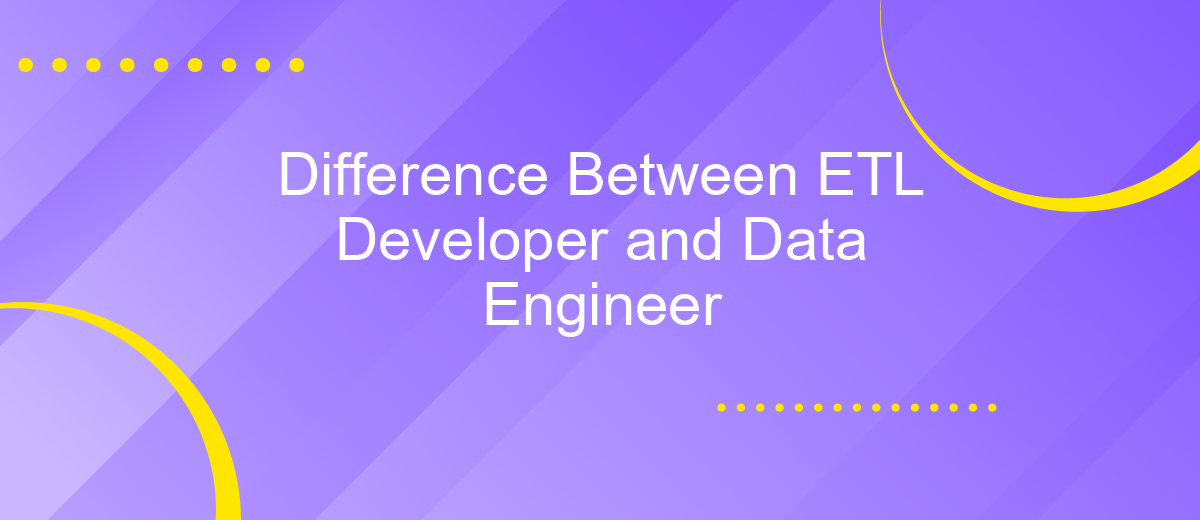Difference Between ETL Developer and Data Engineer
In the rapidly evolving field of data management, understanding the distinct roles of ETL Developers and Data Engineers is crucial for optimizing data workflows and infrastructure. While both positions play pivotal roles in handling data, their responsibilities, skill sets, and contributions to data projects differ significantly. This article explores these differences to help organizations and professionals make informed decisions.
Introduction
In the rapidly evolving landscape of data management, understanding the roles of ETL Developers and Data Engineers is crucial for organizations aiming to leverage data effectively. Both positions are integral to the data pipeline, yet they have distinct responsibilities and skill sets.
- ETL Developer: Primarily focuses on Extract, Transform, Load (ETL) processes to ensure data is accurately moved, transformed, and loaded into data warehouses.
- Data Engineer: Designs, constructs, and maintains scalable data architectures and pipelines, enabling efficient data flow and accessibility for analytics.
While ETL Developers concentrate on the technical aspects of data transformation, Data Engineers take a broader approach, encompassing the overall architecture and infrastructure. Tools like ApiX-Drive can be invaluable for both roles, facilitating seamless integration between various data sources and systems, thus enhancing productivity and data accuracy. Understanding these differences helps organizations allocate resources more effectively and build robust data management strategies.
Role and Responsibilities

ETL Developers are primarily responsible for designing and managing the data pipeline, which involves extracting data from various sources, transforming it into a suitable format, and loading it into a data warehouse. They focus on the technical aspects of data manipulation, ensuring data integrity, and optimizing ETL processes for performance. ETL Developers often work with tools and platforms like Informatica, Talend, and ApiX-Drive to automate and streamline data integration tasks, making the data readily available for analysis.
Data Engineers, on the other hand, have a broader scope of responsibilities that include building and maintaining the infrastructure required for data generation, storage, and processing. They design and implement scalable data architectures, develop data pipelines, and ensure data quality and reliability. Data Engineers work with a variety of technologies such as Hadoop, Spark, and cloud services like AWS and Google Cloud. Their role is crucial in enabling data scientists and analysts to perform their tasks efficiently by providing a robust and efficient data ecosystem.
Technical Skills

When comparing the technical skills of an ETL Developer and a Data Engineer, it is essential to recognize the distinct yet overlapping expertise required for each role. Both professionals work with data, but their focus and tools often differ.
- ETL Developers are proficient in ETL tools such as Talend, Informatica, and Apache Nifi. They specialize in data extraction, transformation, and loading processes.
- Data Engineers, on the other hand, excel in programming languages like Python, Java, and Scala. They are adept at building and maintaining scalable data pipelines and architectures.
- Both roles require a strong understanding of SQL and database management systems like MySQL, PostgreSQL, and NoSQL databases.
- Experience with cloud platforms such as AWS, Azure, and Google Cloud is crucial for both ETL Developers and Data Engineers.
- Additionally, familiarity with integration services like ApiX-Drive can be beneficial for automating and streamlining data workflows.
In summary, while ETL Developers focus more on the specifics of data manipulation and movement using specialized tools, Data Engineers concentrate on the broader architecture and scalability of data systems, leveraging advanced programming skills and cloud technologies.
Data Management Processes

Data management processes are essential for both ETL Developers and Data Engineers, though their roles and responsibilities differ. ETL Developers focus on extracting, transforming, and loading data, ensuring that data flows smoothly from source to destination. They design and implement ETL workflows, utilizing various tools and technologies to automate data integration tasks.
On the other hand, Data Engineers are responsible for building and maintaining the infrastructure required for data generation, storage, and analysis. They work on creating data pipelines, ensuring data quality, and optimizing data retrieval processes. Their role is more holistic, encompassing a broader range of data management activities compared to ETL Developers.
- Extracting data from multiple sources
- Transforming data into a suitable format
- Loading data into data warehouses
- Building and maintaining data pipelines
- Ensuring data quality and consistency
Tools like ApiX-Drive can be invaluable in these processes, offering seamless integration between various data sources and destinations. By automating data workflows, ApiX-Drive helps both ETL Developers and Data Engineers streamline their tasks, ensuring efficient data management and reducing the risk of errors.
Career Path and Outlook
The career paths for ETL Developers and Data Engineers, while overlapping in some areas, offer distinct opportunities and growth trajectories. ETL Developers primarily focus on the extraction, transformation, and loading of data, ensuring that data pipelines are efficient and reliable. Their career progression often involves deepening technical expertise in ETL tools and processes, and they may advance to senior ETL Developer roles or transition into data architecture positions.
Data Engineers, on the other hand, have a broader scope that includes designing and managing large-scale data infrastructure and systems. They work on optimizing data workflows, ensuring data quality, and integrating various data sources. Tools like ApiX-Drive can be instrumental for Data Engineers in automating and streamlining data integrations. As they gain experience, Data Engineers may move into roles such as Data Architects, Machine Learning Engineers, or even Chief Data Officers. The demand for both roles continues to grow as organizations increasingly rely on data-driven decision-making.
FAQ
What is the primary difference between an ETL Developer and a Data Engineer?
What skills are essential for an ETL Developer compared to a Data Engineer?
Can ETL Developers and Data Engineers use the same tools?
How do ETL Developers and Data Engineers collaborate in a project?
What role does automation play in the work of ETL Developers and Data Engineers?
Do you want to achieve your goals in business, career and life faster and better? Do it with ApiX-Drive – a tool that will remove a significant part of the routine from workflows and free up additional time to achieve your goals. Test the capabilities of Apix-Drive for free – see for yourself the effectiveness of the tool.

